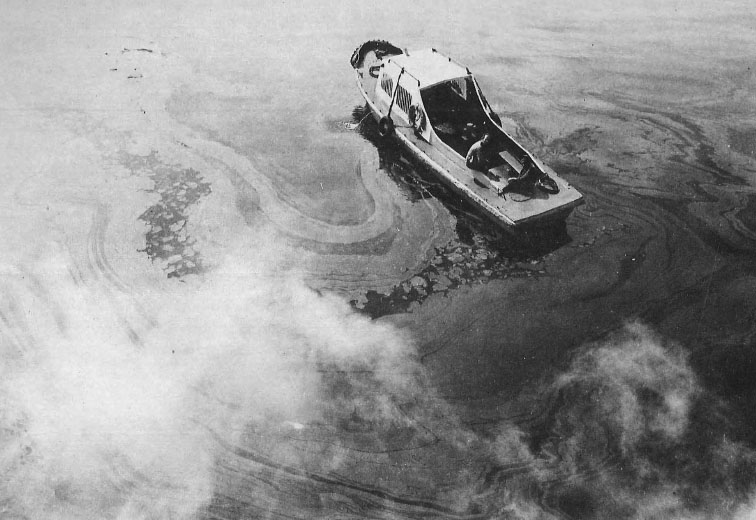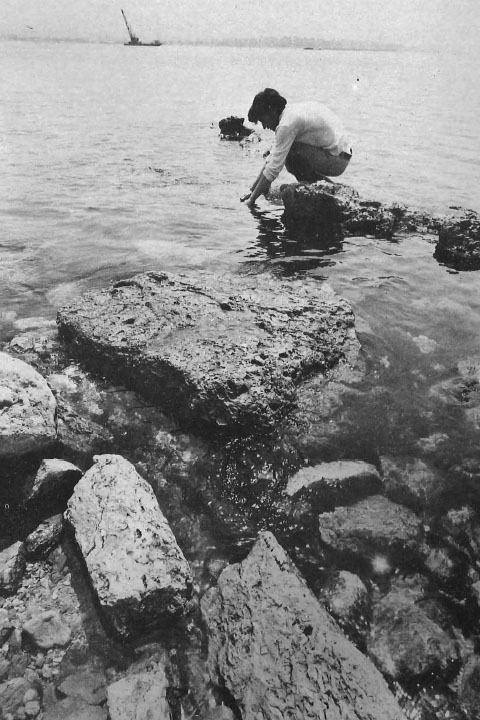Βy the year 1985, tourists may well outnumber the fish in the Mediterranean, according to some pessimistic marine biologists. A project currently under way is expected, however, to avert such a dire development in the Greek seas. One of several being set up by the Environmental Pollution Control Project (EPCP),the program is a joint venture of the Greek government, the United Nations Development Program and the World Health Organization. Begun in 1973 at a time when there was little public awareness in Greece of the hazards of pollution, the objective of the EPCP has been to combat air, noise and sea pollution. In the first stage of the project involving sea pollution, in-depth studies of the existing situation were conducted by a team of young professionals working with consultants from abroad. The second stage—that of action—is now underway.

Pollution of the Mediterranean is not exclusively a Greek problem, of course, and its effects influence not only all Mediterranean countries but the millions of tourists who yearly visit this area of the world. A grim warning was sounded earlier this year by Richard Helmer of the World Health Organization: ‘The present situation constitutes a significant health hazard in many places; typhoid, dysentery, viral hepatitis and poliomyelitis have all been endemic in the Mediterranean area during recent years and there have been a number of cholera outbreaks. Moreover, whereas as eight million workers from Mediterranean countries work in the industrialized areas of northern Europe, thirty million tourists, mainly from those same areas, spend their holidays on the shores of the Mediterranean. There is thus a considerable potential for exchange of pathogenic agents and no country can be complacent about its own situation’.
Indeed, environmentalists have long been sounding the knell for the Mediterranean and evidences of pollution have become all too familiar — from oil-covered feet and towels to the diminishing population of marine life.

Geographically, the Mediterranean is more a lake than a sea. It takes almost one hundred years for the Mediterranean to change its.waters, refilling from the Atlantic through the Straits of Gibraltar, and from the Nile, Rhine and Po Rivers. Pollution in the Mediterranean is aggravated by long periods of calm water and relatively high temperatures. Because of the lack of significant tides, various pollutants are trapped along the coast line instead of being carried out to sea. Oil and refuse are becoming commonplace blights on many beaches. Although oil and industrial waste receive most of the publicity, they are not the only offenders; sewage, too, is a major problem and its dispersal a long process. Ironically, the many tourists attracted to the lovely beaches and the sea contribute to the problem. The increase in sewage requires more oxygen for decomposition, leaving less for all forms of marine life.

One of the major causes of sea pollution in the Athens area is the city’s outdated sewage system which is ill-equipped to deal with a population that now numbers three million. The existing facilities consist of a central system in the older parts of the city and independent systems in the newer areas, supplemented by septic tanks in many areas which are disposed of in the central system. The collected water waste, which currently amounts to an average flow of about 360,000 cubic metres a day, is transported through a four kilometre tunnel which empties into Keratsini, a promontory about two kilometres northwest of the entrance to Piraeus Harbour. This system was adequate for a small town, but not a city the size of Athens today. The construction of piers in the Piraeus Harbour has greatly hampered the sewage dispersal and reduced the formerly efficient flushing action of Elefsis Bay which previously prevented sewage accumulation. Further harbour developments are imminent, increasing the likelihood that Keratsini’s immense sludge blanket will slowly move further and further along the beaches of the Saronic Gulf, unless the situation is corrected.
The EPCP has made exhaustive studies and analyses of the situation and their Project Manager, Dr. Alexander Gilad, is now exploring a solution which, if it proves successful, could revolutionize disposal problems. Dr Gilad’s theory involves the extensive dispersal of the city’s waste. Any large amount of organic matter, if left undisturbed, will not decompose significantly. If dispersed, however, it becomes fertilizer. In the same way organic matter can become a valuable fertilizer to the sea if it is distributed over a large area. Not only will the coastal areas be clean but the ecological balance will be restored and the sea will once again become a rich breeding ground for marine life. The entire project, which will include modernizing the city’s existing disposal system, is being financed by the Greek government. It has been contracted out to an English civil engineering firm and will take two years to complete. New legislation will also be introduced by the EPCP in order to combat industrial pollution.
Polluted waters can be cleaned. Londoners have witnessed the return of marine life to the River Thames. In New York, life has returned to the formerly heavily polluted rivers surrounding Manhattan island. There is every reason to hope that the seas around Athens will also be revived, returning life to the threatened Mediterranean.







